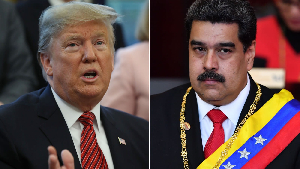Bukom: heartbeat of African boxing
BBC -- The Bukom area of Ghana's capital Accra - a few corrugated shacks and a dusty square - is a fight town without equal.
Although there is little more in terms of equipment than a rusty ring with a forlorn punch bag swinging from a tree, Bokum has been the breeding ground for countless champions.
Even the school playground has a boxing ring marked out instead of a hopscotch grid.
"It has produced a well-spring of great boxers," Moses Affamoyne, of the Ghanaian Boxing Authority, explained to BBC World Service's Fight Town programme.
World Champions DK Poison and Azumah Nelson both began their careers in Bokum, as did all of Ghana's early boxing pioneers.
Fighting fishermen
The heat in Bokum is oppressive, and virtually guarantees no boxer will have problems making the weight.There are six boxing clubs in the tiny community - more than many entire nations possess.
"Boxing is the main subject over here," Yofi Barn - without doubt the most successful manager in Ghana, and father-in-law of Nelson - told Fight Town.
"We have a square where all that goes on is arguments about boxing - who is supreme, who beat the others."
The sport developed in Bokum as the pastime of the fishermen.
When they returned from the seas in the evenings they had little to do, and out of that developed a desire to compete with the other quarters of the Gha province.
By the early 20th century, a whole culture had been grown and structured around fist fighting.
After the fights, the winner would be raised high and carried through the streets to celebrate their achievement - and out of this developed Ghana's early champions.
Imperial champion
Roy Ankrah, one of Ghana's foremost boxers, was the first of these.Ankrah moved Ghanaian boxing into a wider arena when he joined the British army and was trained by British boxing trainers.
On his return to Ghana, he taught what he had learned in the army to the community.
In April 1951, Ankrah won the British Empire featherweight title - which, coming just after the release from prison of political leader Kwame Nkrumah, had a huge impact through all Ghana.
"You can understand the tremendous influence it had on Ghanaians," said Sammy Okaitey, the Sports Editor of Ghana's Daily Graphic.
"He let all Africans shed the complex they had hitherto had, to believe that it was possible for them to be on their own and do things for themselves.
"Within that context, boxing assumed a huge political dimension."
Subsequently Gitu Robinson bid for the world title.
Although he failed, 10 years later DK Poison became the first Ghanaian World Champion.
And 10 years after him came Nelson.
"You can see the trend, that each decade something unique comes out of Bokum," Okaitey said.
Accepted bullying
These days, Bokum's children do not wait to become fishermen before they begin fighting."Fighting tradition in Bokum starts at a very young age," said Rexford Azumah Koffi, a manager of several Bokum prospects.
"It usually starts with kids going out and picking on other kids - which, I should say, is an accepted form of bullying, whereby you have to take it.
"But then, in a matter of time, you also have to get tough out there and try and find someone to bully."
He added that it was this "accepted bullying" that helped Bokum's boxers to develop.
"The more you get bullied, the more important it is to your development," he said.
"Everyone just about survives - everyone has someone on the list as a victim.
"Once you keep going out there and picking on other kids, you're a survivor - and you become a very popular young man.
"Once that happens, you're only destined for one place - the ring."
Hope
Indeed, according to some, the tough struggle to survive is precisely what spurs on Bokum's fighters. "You've got to give people hope in life, and for the people of Bokum, boxing is hope," explained Claude Abrams, editor of Britain's Boxing News.
"You go into a run-down gym, and the boxers in that gym have excelled because of the environment - because of the smell, because of the sweat, and the poor equipment, and they think 'I'm going to do my level best to be a champion because this hardship is what I've gone through to get here.'
"They've used that hardship to become better fighters.
"You take that factor away, you could be destroying the actual crux of what's made Bokum function."












